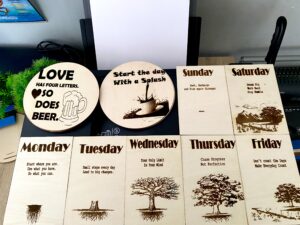Financial Literacy is just as important as Sexual Discipline

You might be thinking to yourself, how is Financial Literacy just as important as Sexual Discipline. That’s just madness… Right?
The next few articles will be a concentration of double entendres, therums, profundity and pontifications as we try to establish whether there is even a remote possibility that these two concepts are related or not. As I gather my research and present my findings please make note that I am not an expert when it comes to the indulgences of the sexual nature and fornication. Neither am I versed at PhD level regarding financial chemistry. On either side of the spectrum however, to be fair, I know just enough to get by. With that disclaimer out of the way, let’s us begin.
Scenario
Try to think of it this way. You’re a 25year old man at the peak of his life. You have a paying job, you sleep with anybody who is willing to pull down their pants for you. Spending money on all these women, making babies, buying cars and alcohol, nje you’re having a very nice time. By the age of 40 you realise that you need to settle down. You buy a house, find yourself a wife and start building an empire with a secure future for your family and other children.
In an alternate reality, you’re a 25 year old man, also, at the peak of his life. You are loyal to the bone, you marry your current girlfriend or long term girlfriend that you met in Varsity or high school. You build your empire, you have kids and live happily.
Taking into consideration these two realities, which version of yourself will be in a better position, not only financially, but also in terms of health and securing a solid future for your family?
Focus
Side note: The above scenarios apply to women as well.
Besides spending your life simply wafting about, the ideal approach to complete fulfillment is the acknowledgement and awareness of your reality. Before we establish whether sexual discipline is just as important as financial literacy, let us first break down and define the concept of financial literacy in this article.
Financial Literacy
Financial literacy is the ability to understand and effectively use basic financial logic to secure a better tomorrow. This includes but is not limits, personal financial management, savings, investing and budgeting. Financial literacy helps individuals to become self-sufficient so that they can achieve financial stability. Money is everything nowadays. The more you have, the more the odds are in your favor for a better standard of living.
Those who understand the concept of financial literacy are able to answer many questions about purchases, such as whether an item is necessary, affordable, an asset or a liability. These people are also able to manage their income and expenses accordingly so that there is a balance between the two for finacial security.
More often than not, you would find that these people have an extra source of income besides a salary or wages for example. They have the ability to make their money work for them to make more money out of it.
However, in the same breath, many people become victims of predatory lending, subprime mortgages, fraud, and high-interest rates which potentially results to bad credit, bankruptcy, foreclosures, repossession, court judgements and lack of financial freedom due to financial illiteracy.
The key to financial literacy is the understanding of five fundamentals, and how they interlink with one another:
- Income
- Savings
- Budget
- Debt
- Expenditure
The system is pretty straightforward and very simple. The hardest thing about it is descipline and being honest with yourself about your income and spending habits. The illustration below highlights these five fundamentals.

Income/Earn:
Money received on a regular basis.
- Salary
- Wages
- Rental income
- Sales (profit)
- Service income
- Commission
- Allowance (Pocket money)
Society has made money to be the primary source of survival through trade and value. The origin of money, the Mesopotamian shekel – the first known form of currency – emerged nearly 5,000 years ago in Asia Minor. Elites of Lydia and Lonia used stamped silver and gold coins to pay armies. This, since the 1600’s has been bleached to paper money as a representation of gold and other precious metals.
What does this mean for you and me in relation to Financial Literacy?
If we do not earn, we will not reap the benefits and spoils that civilization has to offer. There will be no fancy cars, no luxury houses, no designer clothing, no entertainment commodities such as alcohol and tabacco. There will also be no basic needs of survival available other than those provided by Mother Nature.
To an extent, according to the superficial standards depicted by society, your relationship and sense of security will be effected. There will be poverty and various other socio-economic problems that make life extremely difficult. We should by all means avoid this. Check out our article on https://yfapublications.co.za/how-to-make-money-from-nothin/
Savings/Invest:
Income not spent; put away for rainy days or planned vacation or retirement or for whatever reason.
The problem with saving is that the worth of the money saved becomes less in value each year. One million Rand (ZAR) saved in 2010 does not have the same value as One million Rand in 2021. Today we see a spike in tax rates, VAT, petrol prices and electricity rates in exuberant proportions. Saving may have worked back in the day three generations ago however, this outdated method will leave you more broke than you were before. The solution to keep up with the decreasing value of money nowadays is investing. This does not mean do away with saving. No. Simply add investments to the existing method. Improve your financial literacy.

Savings and Compound Interest
The addition of interest to the principal sum of a loan or deposit, or in other words, interest on interest. It is reinvesting interest, rather than paying it out. This means that the interest in the next period is then earned on the principal sum plus previously accumulated interest. The power of Compound Interest shows how you can really put your money to work and watch it grow.
For example: If you deposit R1 000 in an account that pays 1 percent annual interest, you’d get R10 in interest after a year. Compound interest is interest that you earn on interest. So, in the above example, in year two, you’d earn 1 percent on R1 010, or R10.10 in interest payouts. Compound interest accelerates your interest earnings, helping your savings grow more quickly.
The formula for compound interest is:
Initial balance x (1 + (interest rate / number of compoundings per period) number of compoundings per period x the number of periods.
Consider the example below:
You have R100,000 in two different savings accounts, each paying 2 percent interest. One account compounds interest annually while the other compounds the interest daily. You wait one year and withdraw your money from both accounts.
From the first account, which compounds interest just once a year, you’ll receive:R100,000 x (1 + (.02 / 1)1×1 = R102,000From the second account, which compounds interest each day, you’ll receive:R100,000 x (1 + (.02 / 365)365×1 = R102,020.08.
Because the interest you earn each day in the second example also earns interest on the days that follow, you earn an extra R20.08 than you would in the account that compounds interest on an annual basis.
This sounds pretty complicated, had you been paying attention in that math class this would all be coming back to you. However, no worries, having this knowledge, especially when you want to start saving and investing, can most definitely improve your financial position long-term.
Type of investments
Stock
Companies sell shares of stock to raise money for start-up or growth. When you invest in stocks, you’re buying a share of ownership in a corporation. You’re a shareholder.There are two types of stock:
- Common stock: Shareholders have a percentage of ownership, have the right to vote on issues affecting the company and may receive dividends.
- Preferred stock: Function similarly to bonds where investors have a guaranteed fixed dividend in perpetuity. There are no voting rights. So when it comes time for a company to elect a board of directors or vote on any form of corporate policy, preferred shareholders have no voice in the future of the company.
- Growth Stocks: Companies issuing growth stocks focus more on growing by re-investing their earnings to accelerate business expansion, than paying dividends to the investors.
- High Dividend Paying Stocks
Bonds
When you buy a bond, you’re lending money to a company or governmental entity, such as a city or state. Bonds are advisably a more stable investment in comparison to stocks because they provide a steady flow of income. However, their long-term return probably will be less when compared to stocks because of the fixed rate.
Exchange-Traded Funds (ETFs)
ETFs are a collection of securities like stocks, bonds and/or commodities that are traded on an exchange. They are traded through a JSE broker. All these may sound similar to mutual funds, but the difference lies in liquidity, costs involved and management styles.Investing in ETFs carry similar risks of market crashes and fluctuations in the value of assets.
Property
One of the best investments that can be made. People are always in need of shelter. It is a basic human need. Should you invest in a human need, and play around with the affordability, you will make money. There are two options when it comes to property investment
- Flipping houses:
- Buying property for cheap, fixing it up and reselling at a high price or market price.
- Rental
- Buying property for the sole intent of renting it out for rent income. This can be a house, piece of land, apartment building or apartment unit. You can even build a block of flats in your backyard.

Budget:
An estimate of income and expenditure for a set period of time. This is a process of accurately estimating where your money is, when and how much. It can be seen as a form of protecting your money by making educated predictions based in how much you earn, have saved and how much you spend. Looking at it this way, setting up a budget can be the most exciting thing to do. It brings order in a chaotic life and brings a sense of comfort in finances. Failing to plan is planning to fail. A budget is a plan for your financial success.
Components of a budget
The first budget you create might be a challenge, but it is a good learning experience and a good way to understand your funding. The best place to start is getting to know your budget components.
1. Estimated revenue
This is the money you expect to make from all your income ventures. These include:
- Salary
- Wages
- Rental income
- Sales (profit)
- Service income
- Commission
- Allowance (Pocket money)
2. Fixed cost
The moment that you set your income aside, be prepared for a very harsh reality check. Some examples of fixed costs include building rent/ mortgage payments, insurance premiums, car premiums, home security. Factoring these expenses into the budget is important so that you can set aside the exact amount of money required to cover these expenses. They can also be a good reference point to check for problems if your finances aren’t going as planned. Increased fixed costs often lead to major instability and debt.
3. Variable costs
This category includes the cost of goods or services that can fluctuate on a month-to-month basis. For example, groceries, internet usage and electricity bills. These are just examples to give an idea of what can be included in this budget catagorh depending on preference and priority but remember a budget is about self-honesty. Being untruthful to one’s self is only detrimental to the cause.
4. One-time expenses
These are once-off, unexpected costs that you might incur in at any given time. Some examples of these costs include replacing broken furniture, paying a excess fee to replace a lost or stolen device, or even a family emergency.Since it is difficult to predict these expenses, there is no certain way to estimate for them. But it’s wise to set aside some cash for this category to stay prepared. On the Roadtrip: A Self-guide to Success, chapter 2 (preparing for the trip), we talk about being prepared for an emergency. Reading the chapter will better increase understanding of how to best accomodate the once-off expenses to incorporate into the budget.
5. Cash flow – Disposable income
This is the money that you can spend on whatever after all you have sorted out all the income and expenses. You can get an idea of it from your previous months actual finances and use that information to forecast your earnings for future budgeting. Pay attention not only to how much money is coming in, but also when, how much is being spent and on what. Knowing this, will put into perspective any wasteful expenditures that would assist in putting money to better use.
6. Profit
The final budget component is profit, which is a number you arrive at by subtracting your estimated cost from revenue. Life is a business transaction because money revolves around everything that we do. It is thus imperative that in whatever we do with our finances, we make some sort of profit out of it. Not for any particular use, but just for the luxury of having such a comfort. This, will most certainly keep one out of debt, which we will discuss in the next section.
Debt:
Borrowed money under the condition that it will be paid back at a later date with interest (secured, unsecured, revolving, or mortgaged).

Types of debt
Mortgage: A loan – provided by a mortgage lender or a bank. – that enables an individual to purchase a home or property. Renting costs less money. The funds that would normally be used toward a down payment or higher mortgage payments can be invested into savings accounts that give higher returns. When owning a home, the you are responsible for all repair costs. However, as a renter, you have less of a tax impact on your financial situation. Of course, this does not mean do not go buy a house if you want one.
Short-term loan: A short term loan is a type of loan that is obtained to support a temporary personal or business financial situation. It involves repaying the principle amount with interest by a given due date, usually a few months or year.
Debt review
Section 86 of the National Credit Act, is the process whereby a debt counsellor assesses a client’s outstanding debt and implements a restructured debt repayment plan. This will be done through the process of renegotiating interest rates with credit providers in order to reduce them, as well as by extending the debt repayment terms.
There is a lot of stigma around Debt review so let’s clear some air. Is it a good or bad thing?
The answer is undoubtedly that debt review is a very good thing for over-indebted consumers. In the long run, Debt Review not only provides debt relief to over-indebted consumers from their creditors but by staying with the process, it will eventually help you pay off all your creditors and enjoy a debt-free life.
Advantages
- All debt payments are consolodated to one affordable monthly repayment.
- Assets are protected from repossession.
- There is no permanent record of ever undergoing debt review
- You do not pay more than you can reasonably afford.
- Legal protection
- You and your assets are legally protected by the NCA from creditors.
- Your debt counsellor will take over all communication with creditors on your behalf.
- No blacklisting
- Once you have completed the debt review process, the credit bureaus have no permanent record that you have ever been under debt review.
Once you’re under debt review, your credit profile is flagged at the credit bureaus. You can not take out any debt until the debt review process is complete. This is a great way to stay clear of incurring more debt and start focusing on a debt-free future. Once you have settled all your debts, you will receive a clearance certificate and the credit bureau will be notified to remove the flagged listing.
The duration of your debt review depends on a number of factors, including:
- How much debt you have currently
- Your debt interest rates
- How committed you are to becoming debt-free.
What are the negatives of being under debt review?
- This process is only applicable to South Africans
- Missing one month installment will result in creditors canceling the agreement and taking legal action which will result in judgments and garnishment.
- One needs to be over indebted to qualify.
Predetory/reckless lending
The National Credit Act, Act 34 of 2005 prohibits reckless credit granting with the aim of resolving the problem of over-indebtedness and preventing reckless credit lending. In terms of section 81(2) of the NCA a credit provider may not enter into a credit agreement with a consumer without first taking reasonable steps to assess the consumer’s debt repayment history, existing financial means, prospects and obligations, his understanding of the risks and costs of the proposed credit, and his rights and obligations under a proposed credit agreement. The credit agreement will be reckless in terms of the NCA if the credit provider fails to conduct this assessment, irrespective of the outcome of the assessment.
If you are over indebted, it is most probably because your credit providers did not conduct an affordability assessment before entering into a credit agreement with you. Or, you did not understand and acknowledge the risks, costs or obligations of the loans. Even if you became over indebted because you entered into a credit agreement in the first place, all these factors could be classified as reckless lending. Nevertheless, if you lack the financial literacy to understand how money works, you will forever be a victim of such trauvasties.
Expenditure:
In Financial Literacy, this is the amount of money spent in any given time. See the one thing about having money, is the ability to spend it. The more things that money can be spent on, the more having it makes it all the worthwhile. The entire consumer model is designed to make sure that money can be spent at every given second. This makes room to limitless possibilities and actually gives product manufacturers and service providers to pray on the consumer in order to thrive and make a profit.
Looking back into the budget, expenditures include:
- Fixed costs
- Variable costs
- One-time expenses
- Disposable income
The consumer, you and I, fall pray to these four factors expenditures every single day of lives. With little money, socio-economic factors such as poverty come into play and pickles such as large amounts of debt, predatory lending, subprime mortgages, fraud, and high-interest rates which potentially results to bad credit, bankruptcy, foreclosures and repossession of property and assets occur. Those who can manage their finances as according to the budget components, would either live a well-balanced financial lifestyle or fall victim to Compulsive buying disorders (CBD) characterized by excessive shopping cognitions and buying behavior that leads to distress or impairment. Meanwhile other people, of cause, grow to be the very few elite that own everythat everyone else buys.
Expenditures are a paradox that make people fundamentally susceptible to circumstances that link directly to emotions and mental health. The euphoria of a purchase can become an addiction that needs to be constantly fed. Majority of people with this addiction do not have the finances to sustain it…
Quiz
Take the quiz below to see how your manage your expenditures.
We strongly encourage that you take the quiz as a means of figuring out what type of person you truly are before you start creating your budget. This will improve your Financial Literacy. Remember a budget is a true reflection of you reality, your needs, wants and ambitions. It is imperative that the mind is out into perspective and positive purpose before we can even think about creative space for another person to fit into our lives. This is a skill that we need as we progress to the next article.
Click on image below:





